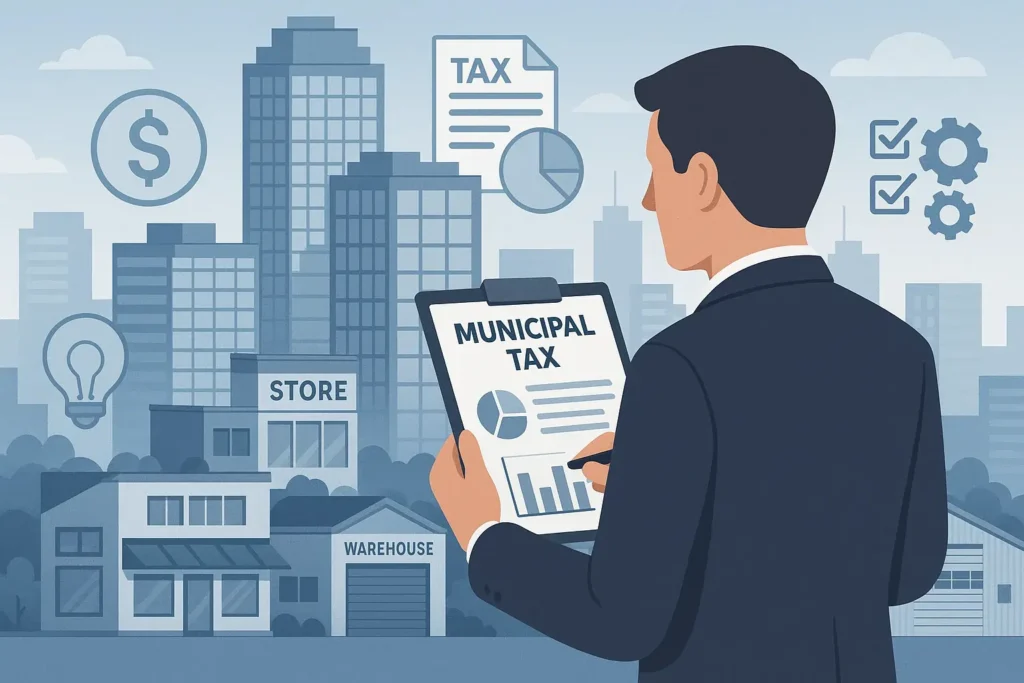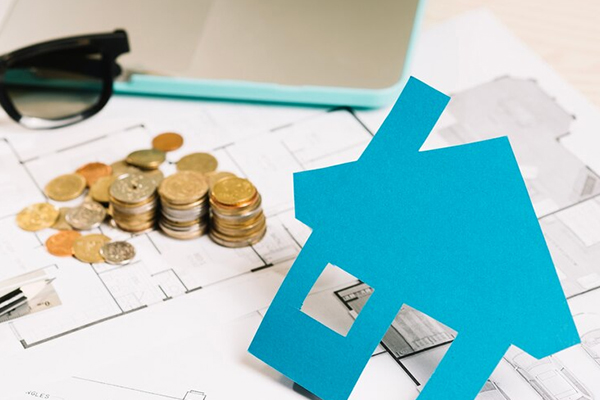If you own or plan to invest in commercial real estate in India, understanding municipal tax is essential. Whether it’s a retail shop, office space, warehouse, or showroom, commercial properties are subject to specific taxes imposed by local municipal authorities. These taxes not only affect your operational costs but also influence long-term investment planning.
This blog explains what municipal tax on commercial property is, how it’s calculated, who pays it, and how to manage it effectively—while complying with all legal norms.

What is Municipal Tax?
Municipal tax, also known as property tax, is a levy imposed by the local municipal corporation or urban local body on immovable properties. It is applicable to both residential and commercial properties, but commercial properties are often taxed at higher rates.
Key Highlights:
- Collected by the municipal body (e.g., MCD in Delhi, BMC in Mumbai).
- Mandatory under the municipal laws of each state.
- Utilized to fund civic amenities like sanitation, lighting, roads, and drainage.
Applicability of Municipal Tax on Commercial Property
Who Pays the Tax?
The owner of the commercial property is legally obligated to pay municipal tax annually or semi-annually, depending on the local rules.
If the property is rented out, the tenant is not liable unless specifically agreed upon in the lease agreement.
Which Properties are Taxed?
- Shops and retail outlets
- Office buildings
- Warehouses
- Industrial units
- Commercial spaces within malls or complexes
- Mixed-use buildings (proportional taxation)
Read More:
- What is Gift Deed Property?
- Zero Capital Gains Tax on Property
- Understanding the Property Tax System in Gurgaon
How is Municipal Tax Calculated?
Municipal tax rates differ across cities and municipalities. However, most urban local bodies in India follow one of the following valuation methods:
1. Annual Rental Value (ARV) System
Tax is calculated based on the property’s expected rental income for a year, irrespective of whether it is rented or not.
Example:
If the annual rental value is ₹10,00,000 and the tax rate is 20%, the tax liability is ₹2,00,000.
2. Capital Value System (CVS)
Here, the tax is based on a percentage of the market value of the commercial property.
Example:
If market value = ₹1.5 crore and the rate is 0.4%, municipal tax = ₹60,000.
3. Unit Area Value (UAV) System
In this system, tax is calculated based on per unit area value multiplied by the property’s total built-up area.
Factors Influencing Municipal Tax on Commercial Properties
Several variables affect how much tax is payable, including:
- Location of property (prime vs suburban)
- Type of use (office, retail, warehouse)
- Property age and construction type
- Occupancy status (self-occupied or rented)
- Carpet area or built-up area
- Amenities available (lift, parking, air conditioning)
Why Commercial Property Tax is Higher than Residential
Commercial properties are considered to generate income or profit, hence taxed at a higher rate. Municipal bodies justify the higher rate by pointing to:
- Increased wear-and-tear on public infrastructure
- Higher usage of civic services (electricity, water, parking)
- Greater contribution expected from income-generating assets
How to Pay Municipal Tax on Commercial Property
Online Payment Portals
Almost every municipal corporation offers online portals for property tax payments. You can use your property ID or holding number to:
- View outstanding tax
- Download receipts
- Calculate dues
- Make digital payments
Offline Payment
Tax can also be paid at municipal offices through cheques, drafts, or cash (subject to limits).
Consequences of Non-Payment
Failure to pay municipal tax can lead to:
- Penalties and late fees
- Interest on outstanding dues
- Property seizure or auction in extreme cases
- Legal notices and recovery action
How to Manage Commercial Property Tax Efficiently
1. Maintain Accurate Property Records
Ensure your property’s size, usage, and ownership are correctly updated in municipal records to avoid overcharging.
2. Set Reminders for Due Dates
Municipal tax is often due annually or semi-annually. Set digital reminders or automate payments to avoid penalties.
3. Check for Rebates and Exemptions
Some municipalities offer rebates for early payment, or exemptions for heritage or charitable-use buildings. Always check the latest notifications.
4. Hire a Property Tax Consultant
If you own multiple commercial units or lack time, hiring a consultant can ensure compliance and optimize your tax strategy.
5. Appeal in Case of Overvaluation
If you believe your property has been wrongly assessed, you can appeal to the municipal valuation department with supporting documents.
Municipal Tax in Major Indian Cities – A Quick Snapshot
| City | Tax Authority | Method Used | Approx. Rate |
|---|---|---|---|
| Mumbai | BMC | Capital Value System | 0.316% – 2.296% |
| Delhi | MCD | Unit Area Value | ₹10–₹275/sq. m. |
| Bengaluru | BBMP | Unit Area Value | 0.2%–2.4% |
| Pune | PMC | Annual Rateable Value | ₹1.5–₹12/sq. ft. |
| Hyderabad | GHMC | Annual Rental Value | ₹50–₹500/sq. yd. |
Recent Trends in Municipal Taxation
- Digitalization: ULBs are encouraging digital payments and transparency through online dashboards.
- GIS-based Mapping: Properties are being geo-tagged to prevent tax evasion.
- Uniform Valuation: Efforts are being made to bring consistency in valuation methods across cities.
Municipal tax on commercial property is more than just a financial obligation—it’s a civic duty that contributes to the upkeep of urban infrastructure. For commercial property owners and investors, understanding the applicable tax, valuation method, and payment deadlines is crucial to stay compliant and avoid penalties.
By staying informed and proactive, you can manage your tax liabilities effectively and ensure that your commercial real estate investments remain profitable and hassle-free.
Always consult a certified tax advisor or property legal expert to ensure you’re paying the correct tax amount and utilizing all legal benefits. Stay compliant, and you’ll safeguard both your asset and your reputation as a responsible property owner.
Want more help managing your commercial property taxes or exploring investment options? Call us at +91-7428812398 for expert consultation.
FAQ,s Frequently asked questions
1. What is municipal tax on commercial property?
Municipal tax, also called property tax, is a fee levied by local municipal authorities on commercial properties. It is used to maintain civic infrastructure such as roads, sewage systems, and public services in the area.
2. How is municipal tax for commercial properties calculated?
The tax is generally calculated based on the property’s annual rental value (ARV), capital value, or area-based rates, depending on the city’s municipal rules. Additional factors like property type, location, and usage may also affect the amount.
3. Who is responsible for paying municipal tax on a commercial property?
The property owner is primarily responsible for paying municipal tax. However, in some lease agreements, landlords may pass on the tax burden to tenants.
4. Are there penalties for late payment of municipal tax?
Yes, late payments usually attract interest, fines, or penalties as per municipal regulations. Prolonged non-payment can lead to legal action or property liens in extreme cases.
5. How can commercial property owners manage or reduce municipal tax?
Owners can manage taxes by keeping property valuations updated, claiming exemptions (if eligible), and paying taxes on time to avoid penalties. Consulting a tax advisor or using online municipal tax portals can also simplify management.




